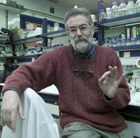Lecturer

Prof. Ricardo Amils Pibernat
Universidad Autónoma de Madrid, Molecular Biology, Faculty of Science, Campus de Cantoblanco
Born in Barcelona in 1947. Graduate in Chemistry, Universidad de Barcelona (1969). He did his PhD research in the Department of Biological Chemistry, Faculty of Medicine at the Universidad de Buenos Aires, Argentina (1979-1973). Doctor in Science, Universidad Autónoma de Barcelona (1973). Research Associate at the Biochemistry Department, Dartmouth Medical School, New Hampshire, USA (1973-1975). Research Associate at the Chemistry Department, Columbia University, New York, USA (1975-1977). Permanent Scientist at the CSIC (1979-1987), Researcher at the CSIC (1987, leave of absence), Associate Professor of Microbiology at the Universidad Autónoma de Madrid (UAM) (1987-1993), Full Professor of Microbiology at the Molecular Biology Department, UAM (1994-2017) and Emeritus Professor at the same university (2017- ). Director of the Department of Microbiology at UAM (1981), Director of the Biology Division (1981-1984), Vice-Dean of Economic Matters of the Faculty of Science, (1984-1986) and Dean of the Faculty of Science (1987-1993). Co-founder of the Astrobiology Center (INTA-CSIC) in which he has been Director of the Astrobiology Department (2005-2009), Director of the Planetology and Habitability Department (2009-2012) and responsible of the Extremofilia Group (1999- ). Member of the Solar Sytem Exploration Working Group, ESA (2011-2013) and Interdisciplinary Scientist of the ESA Mars Express mission (2002- ). Member of Molecular Biology Center Severo Ochoa, CBMSO (1977- ), in which he has been director of the Virology and Microbiology Department (2014-2017). He has 7 positive evaluations of his scientific carrier (1977- ). He has participated actively in projects studying the physiology of thermophilic microorganisms, the inhibition of protein degradation in the model of liver regeneration, total reconstitution of halophilic and thermophilic ribosomes, the evolution of the interaction sites of protein synthesis inhibitors (antibiotics) , genomics of extreme halophilic microorganisms, molecular ecology of of extreme acidic environments, deep subsurfqace geomicrobiology and the study of extreme environments as terrestrial analogues of astrobiological interest. In the last thirty years he has devote an important part of his research to the geomicrobiological characterization of Río Tinto, an extreme acidic environment, its origin, the propkaryotic and eukaryotic diversity in the water column, biofilms and sediments. In the last years he has directed and Advance ERC Project (2010-2015) devoted to the characterization of the geomicrobiology of the Iberian Pyrite Belt (FPI) subsurface with the aim to demonstrate that the extreme conditions existing in the Tinto basin are the consequence of a very active underground bioreactor in which chemolithotrophic microorganisms thriving on the high concentration of metal sulfides are responsible from the generation of the high concentrations of ferric iron and sulfuric acid detected in the river. The geochemical, mineralogical and geomicrobiological data allowed to consider Río Tinto as one of the best terrestrial Mars analogues.
Interview (in Spanish): https://www.youtube.com/watch?v=Toh8k5_fbgU
Video (in Italian): https://www.msn.com/es-cl/video/watch/astrobiologia-marte-sulla-terra-%C3%A8-in-spagna/vp-BBJaqz5
selected publications
Microbial diversity associated with the anaerobic sediments of a soda lake (Mono Lake, California, USA).
P. Rojas, N. Rodríguez, V. de la Fuente, D. Sánchez-Mata, R. Amils, José L. Sanz. Canadian Journal of Microbiology 64 (2018) 385-392.
https://doi.org/10.1139/cjm-2017-0657
Active microbial biofilms in deep poor porous continental subsurface rocks.
C. Escudero, M. Vera, M. Oggerin, R. Amils. Scientific Reports 8:1538 (2018).
https://doi.org/10.1038/s41598-018-19903-z
Study of methanogenic enrichment cultures of rock cores from the deep subsurface of the Iberian Pyritic Belt.
T. Leandro, N. Rodriguez, P. Rojas, J.L. Sanz, M.S. da Costa, R. Amils. Heliyon 4:e00605 (2018).
https://doi.org/10.1016/j.heliyon.2018.e00605
Prokaryotic diversity and community composition in the Salar de Uyuni, a large scale, chaotropic salt flat.
S.S. dC Rubin. I. Marín, M.J. Gómez, E.A. Morales, I. Zekker, P. San Martín‐Uriz, N. Rodríguez, R. Amils. Environmental Microbiology 19 (2017) 3745-3754.
https://doi.org/10.1111/1462-2920.13876
Lessons learned from thirty years of geomicrobiological studies of Río Tinto.
R. Amils. Research in Microbiology 167 (2016) 539-545.
https://doi.org/10.1016/j.resmic.2016.06.001